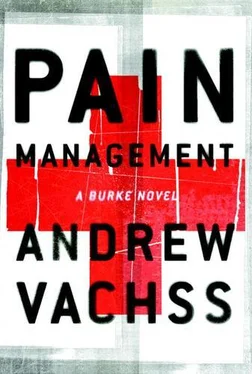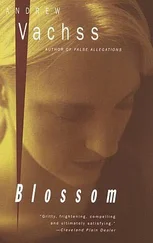“I was waiting for you, Daisy. I wanted to talk to you.”
“Why didn’t you just come to the house?”
“The same reason Rosebud doesn’t write to you there.”
Her eyes flashed at the word “write,” fear and fire each taking a turn. If she’d been a little older, a little more used to deception, she would have kept those eyes on me. But a quick glance to her left told me my hunch about a dead drop had been right.
“I’m not after the letters, Daisy.”
“I have to go back.”
“Sure.”
But she didn’t move, rooted by the letter she hadn’t read yet. It was her link to her sister, and she wasn’t going to let that chain snap without a fight.
“Daisy, listen to me. If I wanted to, I could have hidden myself and waited for you to pick up whatever Rosebud left for you, right? You never would have seen me until it was too late.”
“You better leave her alone,” the child said, drawing herself up to her full height, small fists clenched.
“I am,” I said softly. “I am leaving her alone. I’m not going to try and bring her back. If I wanted to do that, I would have spent the night here in the woods, and just grabbed her when she came to drop off your note. I didn’t do that, either, right? All I want to do is talk to her, make sure she’s okay.”
“She’s fine.”
“I’m sure she is. I just want her to tell me herself. Once.”
“No.”
“Not in person. Not like we are here, you and me. Just on the phone. Give her this card,” I said, slowly taking it out of the breast pocket of my jacket. “It’s got my phone number on it. She can call me anytime. Anytime at all.”
“And you won’t try to—?”
“I won’t try anything, Daisy. I promise.”
“Daisy!” The shout was a lot closer now.
“I have to—”
“I know,” I said, getting to my feet. “I’m going to walk over that way,” pointing to where I’d stashed the car. “I’m leaving the card here, okay?”
I turned my back on her and moved off. She didn’t say anything, but I heard her crashing through the woods, in a hurry now.
On the drive back, I wondered why I hadn’t done what I’d told Daisy I could have—just waited in those dark woods last night and grabbed Rosebud when she showed.
Nothing came to me.
“Anything going on?” I asked.
“All quiet,” Mama said.
“Word’s still that I’m—”
“Yes. All same. You working? In that place?”
“Yeah. Sort of.”
She made a sound somewhere between a sigh and a snort.
“It’s not a big job,” I assured her. “Won’t take much longer.”
“You need Max, maybe?”
“No. It’s not that kind of—”
“Yes. Okay. Fine.”
“What’s wrong, Mama?”
“Wrong? Nothing wrong here. Very quiet, like I say, okay?”
“Sure.”
“Woman still with you?”
“I . . .”
“Woman say marry you, yes? But me, I say: must have permission. You remember, right?”
“Yeah.”
“Woman still with you?” she asked again.
“I think so.”
“Ah!” Mama said. “Better you come home.”
“I have to—”
“When job finish, come home.”
“We’ll see, Mama. I—”
The disconnect click cut me off. That’s how I felt: cut off. My family was still watching out for me. They’d even risked going back to my place for my few treasures. Like the pair of postage stamps that had been canceled inside Biafra during the tiny slice of time when it had functioned as a country. They’d been given to me one ugly night inside the war zone. By an old chief I’d shared the last of my freeze-dried food with. He had nothing else of value to give me, he said. And that, if I managed to survive, the stamps would always remind me of a country that had not.
They’d taken all of Pansy’s stuff, too. Not because I wanted it—I couldn’t even look at it—but because they’d never let the cops have anything that had been part of my heart.
That’s my family. That’s the kind of people they are.
And that’s why I couldn’t go back. Not yet.
“I think you’re right . . . about her still being around, close by,” I told Kevin the next day. “But all of that info’s secondhand at best. I can’t vouch for any of it. And I can’t tell you I’m any closer to her.”
“It’s been—”
“I know. I’ve been out there every day and every night. There’s . . . traces of her in a lot of places, but that’s all they are—traces, not trail-markers.”
“Do you think if you had more time . . . ?”
“This kind of work, you can go for months drawing blanks, then stumble over what you’re looking for. Or it could turn up in a few hours. I seeded the ground heavy and—”
“What does that mean, ‘seeded the ground’?”
“I’ve gone to a lot of places where Rosebud might have been, or where she might show up eventually. I talked to some people who might have seen her, might even know her . . . or that she might run into sooner or later if she’s out there. It’s a thick, deep forest she’s in, but it’s not a big one. The trails crisscross; the same people travel them. I left word. I planted some money, and I promised a lot more. The word’s out. Some have even come to me offering to sell, and—”
“You followed up, didn’t you? These people, they probably have no loyalty. For enough money, they’d—”
“The only following up I did was to offer hard cash for hard information. I don’t care what’s missing—a kilo, a kitten, or a kid—hustlers are going to crawl out from under rocks. I could spend a lot of your money on scams if I wasn’t careful. If any of them have the goods, they’ll have to deal straight up.”
“Why should they trust you ?”
“Let’s say you had . . . uh, let’s say you had a photograph of your great-great-grandmother, okay? It’s the only one in existence; the only connection you have to your ancestors. You keep this photo in a nice frame in your living room. A junkie burglarizes your house, steals a bunch of the usual crap. And he snatches the photo, too.
“So you hire me to get the photo back. Say I find a middleman, someone who can deal with the junkie, all right? I’m willing to spend real coin for the photo, but only for that photo. What’s he going to do? It’s precious to you, but it isn’t worth squat to anyone else. He’s got no bargaining power.
“You understand what I’m telling you? Your daughter’s not worth anything to anybody but you. Nobody’s holding her prisoner. This doesn’t read like a snatch. Not even her cooperating with some boyfriend to hold you up for money . . . even though the odds favor it.”
“Why would you say something like that?”
“In kidnappings when the subject is more than twelve years old, about three-quarters of the perpetrators are known to the victim.”
“I never heard—”
“That’s the latest FBI breakdown,” I told him. “That’s why they collect criminal-justice data in America . . . so someone can get a grant to analyze it. Then they publish it. And write another proposal for more funding.”
“Oh.”
“Yeah. But, look, if it was like that, you would have gotten a ransom demand, way before now. So what’s that leave? She’s out there. Somewhere. People have seen her; they must have. Maybe someone even knows where she’s staying. That’s information. Information is worth money. But only to the person who wants it, like I explained.
“You with me? When it comes to info about Rosebud, I’m like you’d be with your great-great-grandmother’s photo—the only buyer in town. Whoever knows, they may not want to trust me, but what choice do they have?”
Читать дальше











